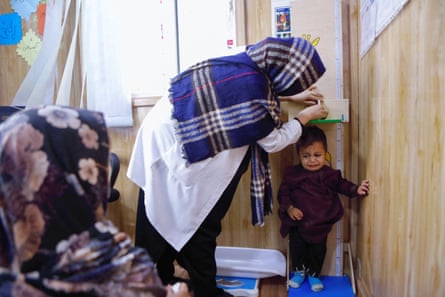More than 200 health facilities run by the World Health Organization in Afghanistan, providing medical care for 1.84 million people, have closed or ceased operating after the US aid cuts announced by the Trump administration shut off life-saving medical care, including vaccinations, maternal and child health services.
On his first day in office in January, President Donald Trump announced an immediate freeze on all US foreign assistance, including more than $40bn (£32bn) for international projects coming from USAID, the United States Agency for International Development. It was later confirmed that more than 80% of USAID programmes had been cancelled.
In Afghanistan, where health clinics have closed in 28 out of 34 provinces, this is leading to an “escalating humanitarian crisis”, according to the WHO, with the country already grappling with poverty and outbreaks of diseases such as measles, malaria and polio.
Afghanistan has already seen a rise in polio cases due to restrictions imposed by the Taliban on its vaccination programme.
Ajyal Sultany, head of communications at WHO in Afghanistan, said: “The closure of health facilities is compounding these crises, with displaced and marginalised communities facing heightened risks of disease, malnutrition, and inadequate medical care.”
In the worst-affected regions – north, west and north-east Afghanistan – more than a third of health clinics have now shut down, according to the WHO, with another 220 health facilities expected to close by June due to a lack of funding.
In some rural areas, the clinics were the only access the local population had to health services. The problem is compounded by the Taliban’s restrictions on women travelling without a male relative as a “guardian”.

Other humanitarian organisations are also feeling the strain of US funding cuts across their global programmes. Save the Children reported that it had to close down 18 of its 32 clinics due to funding shortfalls. “The remaining 14 only have enough funding to remain open for another month,” a spokesperson told the Guardian. “These 32 clinics supported over 134,000 children in January alone.”
Abdul*, a coordinator for health projects in Herat, western Afghanistan, told the Guardian that his organisation had been forced to close 23 of its facilities, including mobile health teams, after it lost funding in January. It had relied on support from international organisations.
“These clinics were located in remote areas of Herat province in nine districts where people did not have access to health services. We covered a population of nearly 120,000, including many women and children, and at least 20,000 new and expecting mothers.
“We were able to secure some funding from a different source and temporarily resume four of the clinics,” he said, but most of the people they help remain without any healthcare services.
Abdul said local populations had appealed to doctors and healthcare workers to keep the clinics open. “Since the closure, people from these communities have been reaching out to us through religious leaders and shuras [gatherings of tribal elders] asking us to reopen clinics.
“Unfortunately, we have tell them, with all transparency, that there is little we can do now,” he said.
The WHO said the availability of healthcare for Afghans may now worsen even further. “The termination of US funding may lead other donors to scale back or withdraw their humanitarian assistance,” Sultany said. “This would further exacerbate operational challenges and reduce the capacity to deliver life-saving services.”
The Norwegian Refugee Council (NRC) confirmed it had been forced to close two community resource centres that had been providing housing, food and other support to internally displaced Afghans, with a further two at risk of closure.
“I want to emphasise that NRC Afghanistan is not shutting down its operations,” said Suze van Meegen, NRC’s interim director in Afghanistan, but she added: “Due to United States funding suspensions and cuts, NRC has been forced to end some of its programming in Afghanistan.”
*Name changed

 20 hours ago
6
20 hours ago
6













































